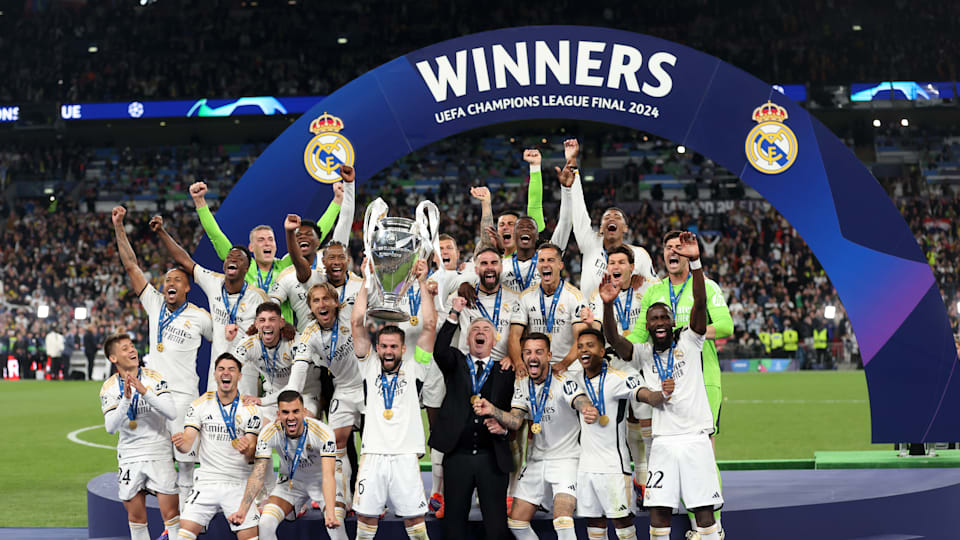UEFA Champions League: The Greatest European Football Competition
The UEFA Champions League (UCL) is not just a football tournament. It is the pinnacle of European club football, bringing together elite teams from across the continent to compete for the most coveted prize in the game.
The Champions League transcends sports, becoming a symbol of prestige, legacy, and intense competition.
Whether you’re a die-hard football fan or someone who appreciates excellence in sport, the UEFA Champions League stands out as an iconic competition that captures the imagination of millions.
Let’s explore what makes the UEFA Champions League the greatest football competition in Europe.
A Historical Journey of Football Greatness

This concept was revolutionary, as it sought to unite clubs that typically competed only within their national leagues.
Evolution from the European Cup:
Over time, the tournament expanded and evolved into the UEFA Champions League, reflecting the increasingly global nature of the sport. The format was refined, increasing the number of participating teams and adding group stages to increase competition. The transformation from the European Cup into the modern-day Champions League also heightened the visibility of clubs that otherwise would have remained local powerhouses.
Milestones and Iconic Moments:
The competition has produced countless memorable moments, from the miracle of Istanbul in 2005, where Liverpool overturned a 3-0 deficit against AC Milan to win on penalties, to Real Madrid’s unparalleled dominance with 14 titles, including three consecutive victories from 2016 to 2018.
These moments have contributed to the tournament’s aura, making it a breeding ground for football legends.
The Structure that Drives Intensity
The UEFA Champions League format is what makes it uniquely competitive. Unlike domestic leagues, where teams have 30+ games to define their season, the Champions League is built on a foundation of knockout stages, ensuring that each match is a high-stakes affair.
Group Stages:
The tournament begins with a group stage, where teams are divided into eight groups of four. They play each other twice, home and away, with the top two teams from each group advancing to the knockout rounds. This phase allows for strategic play, as teams can afford to lose one or two matches but still advance.
Knockout Rounds:
Once the group stages are over, the knockout rounds begin. These two-legged ties are played over home and away matches, with aggregate scores determining the winner. This phase is often where the most dramatic moments occur, with clubs going toe-to-toe to survive and advance. The pressure of away goals and aggregate scoring creates tension that heightens every moment.
The Final:
All roads lead to the grand final, typically played at a neutral venue. The one-game format ensures that anything can happen. One of the most unforgettable finals in history was Manchester United’s comeback victory in 1999 against Bayern Munich, where two goals in stoppage time turned what looked like a loss into a triumph.
A Stage for Football's Best Talent
 The UEFA Champions League is where the world's best footballers showcase their talents. The tournament consistently features a level of competition unmatched in any other event, bringing together the biggest clubs from Europe’s top leagues.
The UEFA Champions League is where the world's best footballers showcase their talents. The tournament consistently features a level of competition unmatched in any other event, bringing together the biggest clubs from Europe’s top leagues.
Star Players:
From Cristiano Ronaldo and Lionel Messi to legends like Zinedine Zidane and Paolo Maldini, the Champions League is a proving ground for the world's top players. Performances in this tournament often define a player’s legacy, and many of the game's greats have achieved their most iconic moments on this stage.
Tactical Mastery:
Beyond the talent on the pitch, the Champions League is where top coaches demonstrate their tactical brilliance. Managers like Pep Guardiola, José Mourinho, and Jürgen Klopp have all used the competition to solidify their reputations. The pressure of facing the best teams in Europe forces managers to innovate and adapt, making the tactical battles in the Champions League fascinating to watch.
Youth Development:
The competition also serves as a launchpad for young stars. Emerging talents like Kylian Mbappé, Erling Haaland, and Vinícius Júnior all made their names in the Champions League, using the global platform to showcase their skills and rise to stardom.
Global Impact and Cultural Influence
The UEFA Champions League is more than just a football competition; it is a global phenomenon that resonates with millions of fans worldwide. Its cultural significance extends beyond Europe, as the tournament attracts viewers from every corner of the globe.
Worldwide Reach:
The final of the Champions League is one of the most-watched annual sporting events in the world, rivaling even the Super Bowl. Broadcasting deals extend far beyond Europe, bringing the excitement of the tournament to audiences across Asia, Africa, and the Americas. This global viewership makes the UCL a unique cultural event, transcending borders and language barriers.
Financial Powerhouse:
The competition’s success is also reflected in its financial impact. Clubs that participate in the Champions League receive significant financial rewards, with prize money, sponsorships, and broadcasting rights contributing to the wealth of the tournament. A successful Champions League campaign can change the financial landscape for clubs, allowing them to attract top talent and grow their brands internationally.
Cultural Symbolism:
Winning the Champions League is more than just a trophy—it represents dominance in the world of football. Clubs that win it enter an exclusive group of elite teams. For players, winning the Champions League is often seen as the pinnacle of their careers, and for fans, it is a symbol of their club's supremacy in European football.
Conclusion
The UEFA Champions League is, without a doubt, the greatest football competition in Europe. Its rich history, intense competition, and global reach make it a unique spectacle that captures the hearts of fans and players alike. From historic rivalries to unforgettable moments, the Champions League defines what it means to compete at the highest level of the sport. Its global significance, combined with the quality of football it showcases, cements the UEFA Champions League as the ultimate battleground for Europe’s football elite.
As the tournament continues to evolve, one thing remains constant—its ability to captivate the world with drama, excitement, and world-class football.
References
- UEFA Official Website – The Champions League History
- BBC Sport – Greatest Moments in Champions League History
- The Guardian – Champions League: Tactical Analysis
- Goal.com – Top Players of the Champions League
- Sky Sports – Champions League News and Analysis
- Forbes – Financial Impact of the Champions League
- The Athletic – Behind the Scenes of Champions League Finals
- FourFourTwo – Champions League: Greatest Teams
- ESPN FC – Champions League Highlights and Interviews
- Bleacher Report – Why the Champions League is Special








































